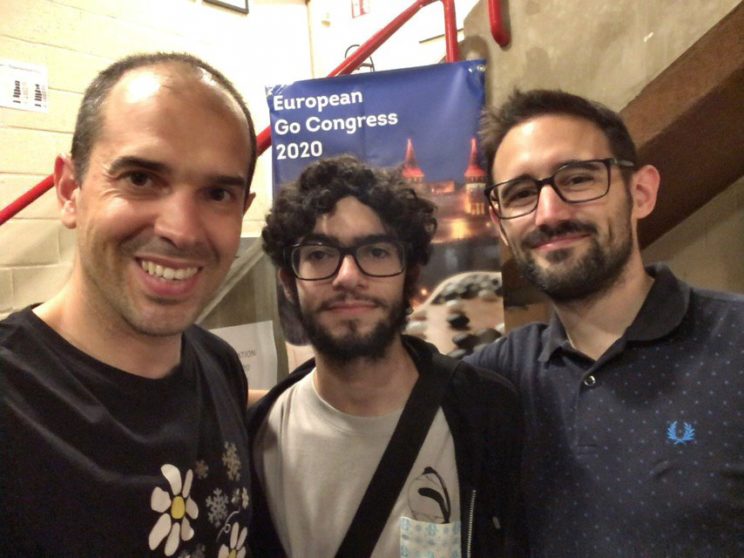Crónicas da viagem do Pedro Carmona ao 31º World Amateur Go Championship na China.
Entrevista do Pedro Carmona à RANKA
Pedro Martins (Portugal, 51st place): I feel OK. I’m happy to have won three games, but I know I could have done much better. I played well against the player from Chinese Taipei, but he is very strong in the middle game. I wanted to be the first from Portugal to win four games. Maybe next time.
Pedro Miguel Martins Carmona (2-kyu, Portugal, on losing to Cheng-hsun Chen of Chinese Taipei): ‘It was a nice experience, starting the tournament by meeting one of the top favorites in the first round. I knew he would be very strong. I didn’t expect to win, but I thought I would just play my own game and see how it went. That’s what I did, and after about an hour, it was time to resign.’
4º Dia
Chegou ao fim a minha participação na 31ª edição do WAGC! Fico com o sentimento de dever cumprido mas com a noção de que a minha participação poderia ter sido bem melhor. Hoje comecei o dia com mais uma vitória contra John Gibson, 2k da Irlanda, mais uma vez num jogo em que controlei do início ao fim sem problemas. à tarde joguei contra Tumelis 2dan da Lituânia, consegui um bom fuseki e até certo ponto o jogo esteve muito equilibrado, mas perdi um grupo no canto e a balança desequilibrou para o lado dele, e algumas jogadas depois abandonei a partida. Fica o saldo de 3 vitórias mas muita aprendizagem e convívio com inúmeros jogadores de todo o mundo que partilham esta paixão que é o Go.
Daqui a instantes irá começar a cerimónia de encerramento e com ela termina este WAGC que pela primeira vez se realizou em solo chinês. Esteve muito bem organizado, não nos tendo faltado nada, só não estiveram bem nalguns pormenores, mas de qualquer modo, fiquei bem impressionado.
3º Dia
Hoje foi um dia inspirador…contudo fiquei com aquele pensamento, se ao menos…
A minha partida contra o Allan da Bélgica, 4 dan, não podia ter começado pior, um joseki errado deu num canto com 40-50 pontos, uma invasão no meu território…fiquei sem ele. Estive perto de desistir mas decidi ir até ao fim, e consegui criar um moyo enorme, ao qual ele ao tentar invadir foi descuidado e permitiu-me cortar e aumentá-lo! O problema foi que no yose perdi um grupo no canto, no entanto apenas perdi por 13,5…penso que teria sido suficiente para ganhar. O segundo jogo foi contra o representante de Madagascar, também não comecei muito bem, cometi um erro de leitura e matou-me um pequeno grupo no início, mas novamente criei um moyo, este gigante (!) e ele tentou viver lá dentro sem sucesso. No final, ainda começamos a contar mas a diferença era tanta que não sei o resultado ao certo, mas ganhei por cerca de 50 pontos.
Amanhã é o último dia, espero conseguir uma ou duas vitórias contra adversários menos modestos, pois até agora só defrontei um oponente que me deu a sensação que não estava de todo ao meu alcance.
2º Dia
De manhã, defrontei o Sotirios Ioannides, 1k do Chipre, foi um jogo bastante renhido, se bem que ele teve várias situações de vida e morte com os grupos dele, mas no final acabou por ganhar por uns 6 pontos. Da parte da tarde, soube que ia jogar contra o representante brasileiro, Csaba Deak 1k, pelo que tinha visto dos seus jogos sabia que era um adversário acessível, e assim se confirmou tendo terminado o jogo sem qualquer ponto de território no tabuleiro. Venci por pouco mais de 70 pontos. Após o jogo tive um episódio curioso, um jornalista perguntou-se se poderia colocar algumas questões relativamente ao meu encontro com o jogador de China Taipei, ao qual respondi positivamente. A entrevista foi relativamente rápida, ele queria saber como me tinha sentido durante o jogo, quais as minhas expectativas e quanto tempo durou a partida. O que me surpreendeu foi saber quem me estava a entrevistar, nem mais nem menos que o senhor James Davies! Para quem o desconhece, é o autor de diversos livros de Go, nomeadamente a Elementary Go series. Amanhã aguarda-me um desafio, um 4 dan da Bélgica, mas há sempre esperança, como demonstrou hoje Loli Puerta, esta jogadora de 3k Venezuelana, presidente da FIG, venceu Wan Kao Lou, o representante de Macau, 5 dan! Tendo sido efusivamente aplaudida pelos vários jogadores que se encontravam a almoçar na altura em que entrou e com justiça, pois mostrou que tudo pode acontecer durante um jogo, basta acreditar e lutar…
1º Dia
Primeiro dia do torneio! Sem grandes expectativas, enfrentei o representante da China Taipei e foi bastante visível a diferença entre as nossas capacidades, tendo acabado por desistir do jogo. Contudo, o meu adversário da segunda ronda, um conhecido meu, Carlos Rios Joels do Peru (1k) era do meu nível. Consegui um bom resultado no fuseki e mantive a liderança até ao fim, mas acabei por cometer uns erros fulcrais e acabei por perder o jogo. Foi uma derrota frustrante mas ainda há muito campeonato, e continua amanhã contra o Chipre. Agora é hora de ir dormir!


